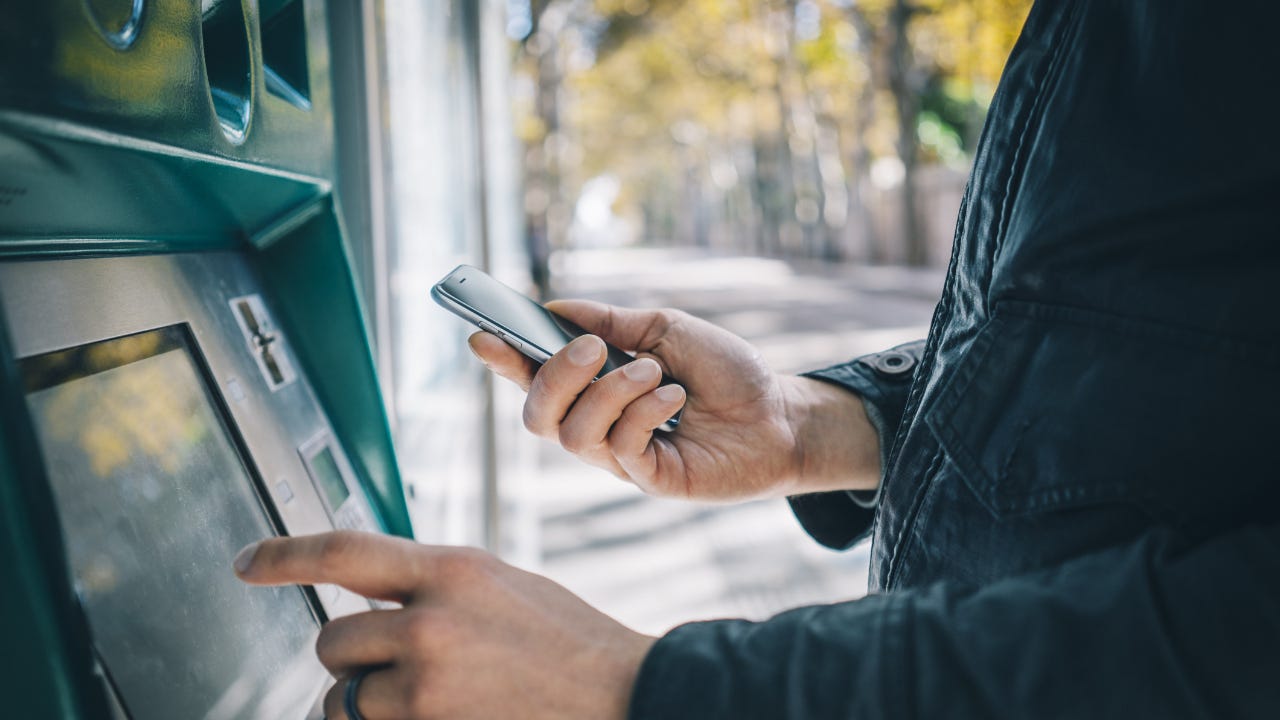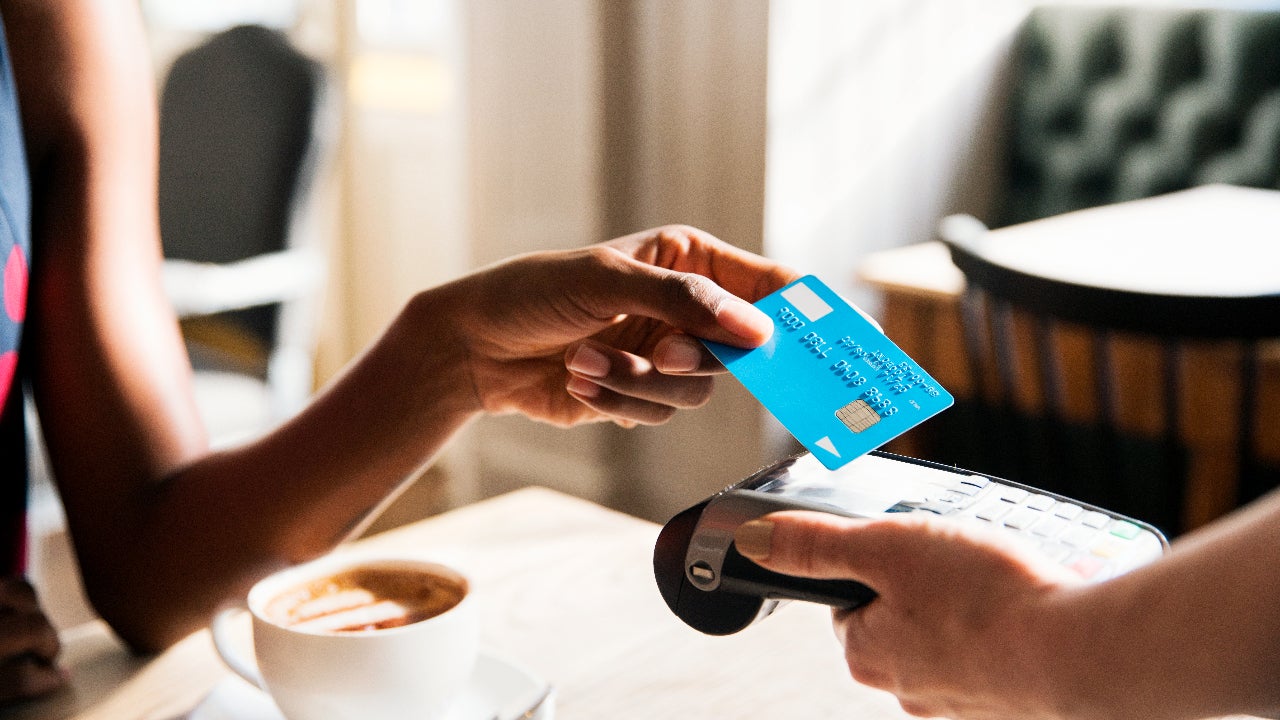What are cardless ATMs and how to use one

Although financial technology is reducing the need to make regular cash transactions, it’s also making it increasingly convenient to get cash when you need it.
Cardless ATMs allow you to perform ATM transactions via your smartphone’s bank app. They’re a convenient way to get money from your bank account if you forget your debit card or if you prefer to minimize the number of times you need to touch an ATM’s screen.
Key takeaways
- Some ATMs do not require a debit card to withdraw cash or make deposits, but you will need your smartphone to verify your identity.
- The majority of cardless ATMs are currently limited to bigger banks including Chase, Bank of America, Capital One and Wells Fargo.
- Cardless ATMs offer the enhanced security protection of being able to leave your debit card at home, but you need to be mindful of the digital risks of having your phone compromised.
What are cardless ATMs and how do they work?
Cardless ATMs provide access to your account and allow you to withdraw cash without the need for a card. Instead, they rely on account verification via text message or a banking app on your smartphone.
There are several ways that cardless ATMs can function. Types of cardless technology include quick response (QR) codes, near-field communication (NFC), verification codes and biometric verification.
QR Codes
To use a cardless ATM with a QR code you first set the mobile withdrawal up on your banking app. The ATM will then display a QR code on the screen for you to scan with your phone before dispensing the money.
Near-field Communication (NFC)
Some services like Apple Pay use NFC, or near-field communication, technology. To use NFC at a cardless ATM, open the app on your mobile device, choose the linked bank account you want to withdraw from and tap your phone against the designated reader. To complete the transaction, the ATM will prompt you to type in your PIN (just as if you had inserted your card).
Verification codes
Using a verification code involves opening the bank’s app on your phone and selecting the type of ATM transaction you’d like to perform. The app then provides a one-time code you’ll enter at the ATM as well as your PIN. The code usually expires after a set amount of time, such as 30 minutes.
Once you enter the verification code, your transaction will take place, which can mean the ATM will dispense the amount of money you indicated you wish to withdraw.
Biometric verification
You may use biometric verification to unlock your smartphone by having it recognize your face or fingerprint. Similarly, some banks can store your biometric data so their ATMs can use them to verify your identity for future transactions. This allows you to withdraw cash or perform other functions without having to provide your card.
How to use a cardless ATM
Using a cardless ATM varies based on where you do your banking, and you may need to use the bank’s app to generate a code at the ATM. In most cases, however, here are the steps to take use a cardless ATM:
- Add your debit card to your digital wallet: Scan your card in your Apple Wallet, Google Wallet or Samsung Wallet, or enter the information manually.
- Tap your phone: If the ATM has a contactless symbol, position your phone next to it and then enter your PIN.
- Complete the transaction: Withdraw cash, make a deposit, check funds – do whatever you need to do, and then, close out the session.
Pros of using cardless ATMs
1. Fewer steps involved
“Our phone is slowly becoming our wallet,” says Drew Cheneler, founder of SimpleMoneyLyfe. Some consumers don’t memorize their account information and rely on facial or fingerprint recognition to access their accounts, he says. Some cardless ATM software allows you to do the same.
2. Access to all your accounts
You might not carry all your ATM cards with you, especially if you use more than one bank. Or, you might have forgotten or lost your card. Cardless ATMs allow you to still have access to all of your accounts, which can be helpful if you are near an in-network ATM, yet don’t have the corresponding card with you, saving you from having to pay out-of-network ATM fees.
3. No need to carry a wallet
It isn’t always convenient to carry a wallet, purse or something else containing your cards. Cardless ATMs allow you to perform transactions if you have your smartphone. Another benefit of not carrying your wallet is it can reduce your chances of getting pickpocketed or robbed.
4. Security
Though they aren’t risk-free, a few features of cardless ATM withdrawals make them more secure. For starters, scammers can’t use skimmers to steal your card data because you don’t insert your card into the ATM terminal. Codes generated for cardless withdrawals are one-time use only, so it does a hacker little good to steal one. Cardless withdrawals also often require two-step authentication, so hackers wouldn’t only need to know your PIN, but they would also need to have access to your phone.
5. A more sanitary option
Cardless ATM withdrawals won’t eliminate the need to touch the ATM, yet they do cut down on contact. And the fewer touches the better, considering how many users might touch an ATM and spread germs between cleanings.
Cons of using cardless ATMs
1. Availability
Cardless ATMs aren’t available everywhere. Even if your bank provides the service and your phone is compatible with the technology, you might not find an ATM near you that’s capable of handling cardless withdrawals.
2. Compatibility
Cardless ATMs rely on smartphones to operate. If your bank utilizes an app, your phone must be compatible with that app, or you can’t use it. Furthermore, not all smartphones are compatible with cardless ATMs.
3. Phone security
Though cardless ATM transactions are generally more secure, they pose a different set of risks.
“Since bank cards are being replaced by phones, criminals will now be more enticed to target and hack your phone to mine your data, information and even change your phone and bank app settings,” says Ricardo Pina, founder of The Modest Wallet. You can help to minimize the risk by keeping your phone secure if you have banking apps installed.
Popular accounts with cardless ATM access
Chase, Wells Fargo, Capital One and Bank of America are all compatible with Google Pay, Apple Pay and Samsung Pay. Since cardless ATM apps from these banks work on each of these services, they are compatible with both Android and Apple phones.
Bottom line
Cardless ATMs are a convenient, secure and more sanitary way to withdraw cash without a card. They’re also handy for emergencies — even if you don’t use them regularly. Look out for the next generation of cardless banking to be even more high-tech, too, with the potential to leave your card and your phone at home.
Why we ask for feedback Your feedback helps us improve our content and services. It takes less than a minute to complete.
Your responses are anonymous and will only be used for improving our website.







